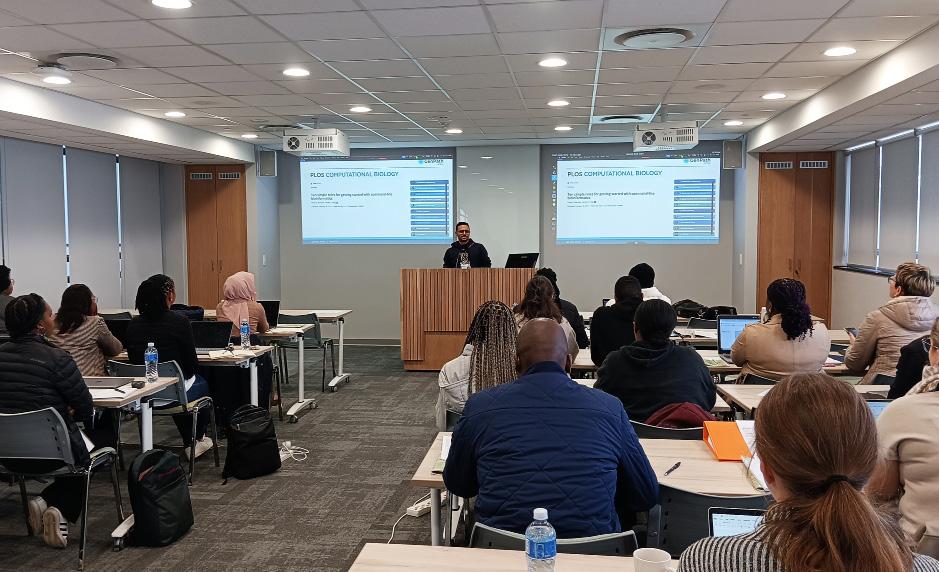
3 minute read
ADVANCING TUBERCULOSIS GENOMICS IN AFRICA
Hands-On Theoretical and Practical Training at Stellenbosch University text: Dr Emilyn Costa Conceição photo: Supplied
From 7 to 10 July 2025, I had the privilege of facilitating the Theoretical and Practical Training in Tuberculosis Genomics Bioinformatics, hosted at the Biomedical Research Institute (BMRI), Stellenbosch University, Cape Town, South Africa. This intensive, in-person training brought together 30 trainees and eight facilitators as part of a collaborative effort spanning several work packages (WPs) under the GenPath Africa initiative’s working packages (WP): WP-1 (Genomic Surveillance), WP-2 (Precision Action for RifampicinResistant TB - PARR-TB), WP4 (Bioinformatics), and WP-5 (Capacity Building).
Why is this Initiative necessary in Africa?
Even though Tuberculosis (TB) has been around for a long time, it remains a major public health problem. Each year, around 10 million people get sick with TB, and more than 1 million lose their lives to the disease. Africa bears a disproportionate burden of TB, particularly in regions with high HIV prevalence, limited access to healthcare, and constrained public health infrastructure. On top of that, TB is becoming harder to treat because some strains of the bacteria no longer respond to the usual medicines. These drugresistant forms of TB are more complicated and expensive to treat and can spread quickly if not caught in time.
This is where new technologies play a key role, helping to make
TB diagnosis faster and more accurate. One example is wholegenome sequencing (WGS), which allows us to gain detailed insights into the TB bacteria. This initiative is especially important because it supports countries across Africa in using advanced tools like WGS to better understand how TB spreads, detect drug resistance sooner, and guide more effective treatment. By strengthening local expertise and infrastructure, we can help build more resilient public health systems, protect vulnerable populations, and take meaningful steps toward ending TB.
How did the Training Course go?
Over four days, the program offered both foundational and advanced modules covering key topics in TB genomics and bioinformatics. These included an introduction to sequencing technologies, use of package managers and containers, version control with Git and GitHub, downloading and submitting genome data to repositories such as NCBI and ENA, secure data handling, and hands-on analysis using the MAGMA pipeline. We also introduced participants to the Nextstrain platform for genomic epidemiology and visualisation.
Which research groups were involved in the process?
The course was led by research teams from Stellenbosch University, including the TB Genomics group (Prof Rob Warren, Dr Emilyn Costa Conceição, and Dr Nabila Ismail), the Centre for Epidemic Response and Innovation (CERI; Prof Tulio de Oliveira, Dr Eduan Wilkinson, and Dr Thomas Sanko), and the Bioinformatics team (Prof Gian van der Spuy, Dr Elizna Maasdorp, and MSc Abhinav Sharma).
Where were the Trainees from?
Trainees represented a diverse range of institutions such as Stellenbosch University, the National Health Laboratory Service (NHLS), Namibia University of Science and Technology (NUST), Instituto Nacional de Saúde (Mozambique), the University of Cape Town, and Groote Schuur Hospital.
Who supported us?
The initiative was co-funded by the Global Health EDCTP3, the European Union, and the World Bank.
What is next?
The training fostered an enriching environment of scientific exchange, skill development, and cross-border collaboration, contributing meaningfully to strengthening TB genomics capacity across Africa. We plan to carry out more initiatives like this, guided by participants’ feedback, and to further strengthen our strategies for building capacity in the highly limited field of Bioinformatics.










